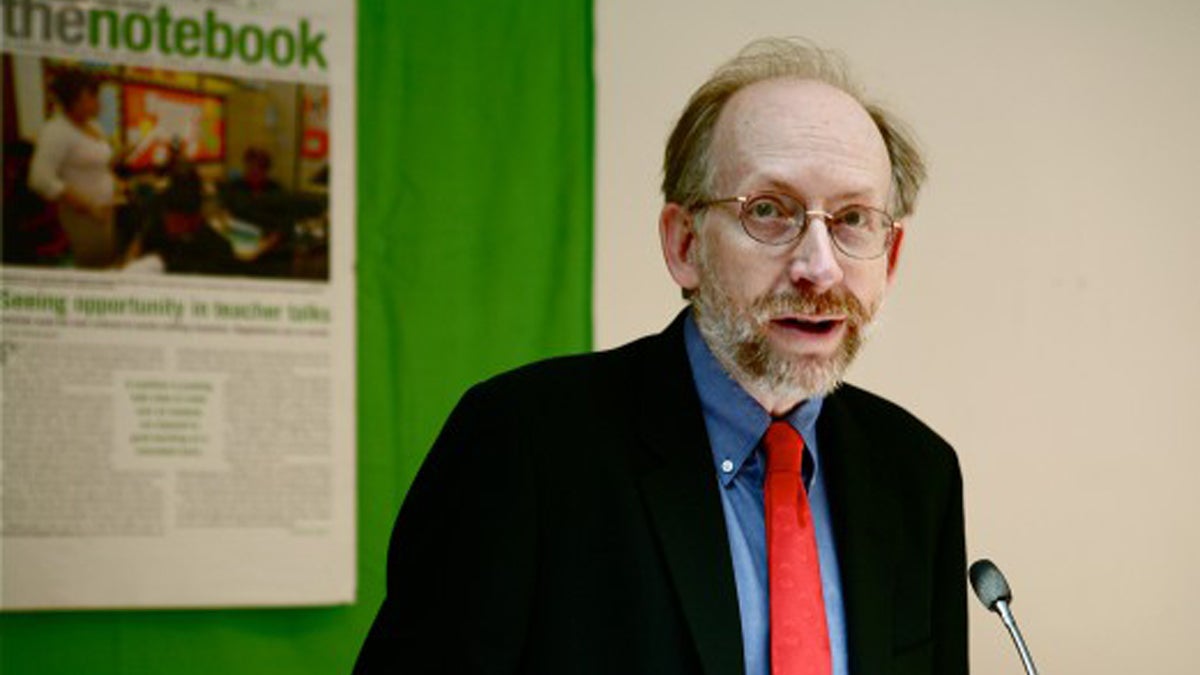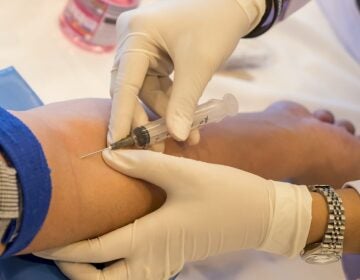A leadership change at the Notebook

Paul Socolar, shown here at the Notebook's annual Turning the Page for Change celebration, was a founder of the Notebook in 1994 and has been editor since 1999. He plans to step down as editor and publisher late this year. (Harvey Finkle/The Notebook)
Editor/publisher Paul Socolar, a founder, will be stepping down in late 2015. A transition plan is in place to identify a successor.
Journalist and public school advocate Paul Socolar has announced that he plans to step down as editor and publisher of the Philadelphia Public School Notebook in late 2015. The nonprofit organization has put in place a transition committee to begin the search for a successor.
Socolar was there at the beginning: stepping forward as a concerned public school parent to become one of the founders of the Notebook at its launch as a free, independent quarterly newspaper in 1994. He became its first full-time editor and director in 1999.
“Paul has been almost a singular force in advancing the discussion of public school issues in Philadelphia,” said Harold Jordan, chair of the Notebook’s board of directors. At the same time, said Jordan, “what has made the Notebook successful is that there is a shared vision, there is a community of people who have kept the Notebook on track and helped it grow.”
Socolar and Jordan said this year the organization is focused on some other significant changes as well, including a long-awaited redesign of the website and an increased presence on social media, both aimed at expanding the Notebook’s parent audience. Ongoing newsroom projects include a focus on mental health issues and trauma-informed practices in schools, the continuing funding challenges facing city schools, and the recently launched citywide READ! by 4th literacy initiative.
“We’re also working hard on ensuring the Notebook’s sustainability by growing our membership,” Socolar said. The Notebook launched a membership program in 2009. “Our audience is in the tens of thousands, so our membership should be more like 6,000 rather than 600. We can do a better job of communicating that the Notebook is a nonprofit that cannot exist without financial support from its readers — like public broadcasting stations.”
With a growing readership on the web, Notebook staff strive to provide timely coverage of the politics, finances, and education trends in the District. Socolar touts the news organization’s commitment to investigative journalism and data presentations in its effort to support parents, students and teachers. The website also offers an outlet for community dialogue and debate.
Celebrating the Notebook’s 20th anniversary last spring, Socolar wrote that the organization has reached new heights “as a professional, nonprofit journalism enterprise with the capacity to function in the intense 24/7 media environment of the 21st century…” – a far cry, he said from the “home-made” Notebook of the early years. Early on, Socolar was the only paid staffer. Then there were several years with just a second writer and a part-time business person.
“It was in 2008 that we really were able to develop a full-fledged professional staff and also bring on freelance reporters who have been writing about education for years,” Socolar said.
After years of operating as a project of Resources for Human Development, a nonprofit human service organization, the Notebook struck out on its own in 2013 and gained tax-exempt status. Partnerships with other media organizations like NewsWorks at WHYY, the national journal Education Week, and public access television organization PhillyCAM have boosted the Notebook’s capacity.
With these partnerships, an experienced, seven-person staff and a committed board with backgrounds in journalism, education, and nonprofit management, Socolar said, it seems “an opportune time for me to transition out of the Notebook. The organization is on solid ground.”
“Lots of places have work to do on their public schools, but only Philly has a Public School Notebook,” said Len Rieser, longtime board member. “Paul and his colleagues have created a resource that’s absolutely unique … and indispensable for anyone who’s interested in making this a stronger and more successful city.”
The Notebook’s strong board and staff team, its journalism partners, its engaged readership, and its diverse revenue base of members, donors, foundations, sponsors, and advertisers all make it a model for successful community-based nonprofit journalism. From modest beginnings as a free newspaper published by volunteers, the Notebook now has a bimonthly print circulation of 60,000 with 48,000 visitors to its website monthly.
Socolar is known by colleagues for having a veritable encyclopedic memory for the details of past administrations, controversies and reforms, successful or not, in the District. He has provided a strong editorial voice for the paper in every print edition since 1999.
Prior to the Notebook editorship, he worked on education issues professionally for the National Coalition of Education Activists and the American Friends Service Committee, and was an involved parent at C.W. Henry School in Mount Airy.
“Paul is a very detail-oriented person. He loves to get to all of the facts at a level I’ve rarely seen,” said Jordan. “There’s an old joke around town—that Paul’s probably the only person who truly understands the School District budget.”
Socolar said he hopes to continue to work in the field of public-interest investigative journalism and plans to stay in Philadelphia, though he looks forward to more frequent visits with his parents, both in their 90s, in New York City. His mother, Sandy Socolar, was until recently a volunteer proofreader for the Notebook.
The Notebook board expects a new organizational leader to be in place by fall 2015, and an event honoring Socolar also is planned for then.
“This operation is going to continue to produce a Notebook of quality that sticks to its values,” said Jordan. He said the Notebook community believes “very strongly in equity, in the notion that public institutions ought to be transparent and that stakeholders ought to play a role in how the institutions are run. When we report on issues, we will continue to look at them through that lens.”
The Notebook will keep readers posted on details of the search and welcomes feedback on this transition: Email transitionteam@thenotebook.org.
WHYY is your source for fact-based, in-depth journalism and information. As a nonprofit organization, we rely on financial support from readers like you. Please give today.




